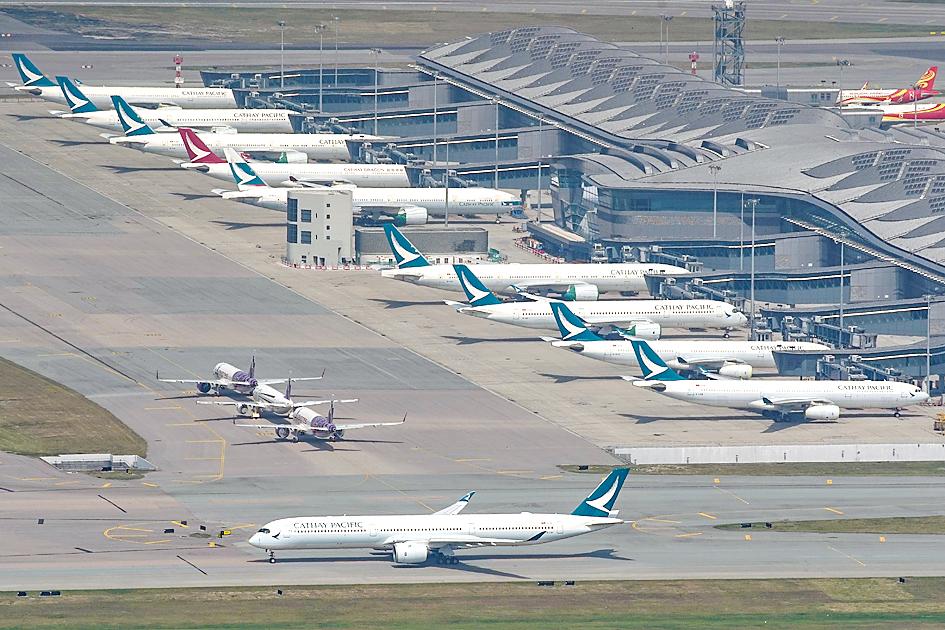Cathay Pacific Airways Ltd (國泰航空) yesterday said it is planning new flight services for Taiwan as it announced a corporate restructuring that included the shutdown of its regional subsidiary, Cathay Dragon (國泰港龍), and could lead to job cuts in Taiwan.
Cathay Pacific said the shutdown means that the one round-trip service between Taichung and Hong Kong per day and seven round-trip services between Kaohsiung and Hong Kong operated by Cathay Dragon prior to the COVID-19 pandemic would be terminated.
“The parent company is planning a new schedule between Taiwan and Hong Kong,” Cathay Pacific assistant manager for corporate communications Moses Hou (侯恩錫) said.

Photo: Bloomberg
Cathay Pacific could operate Cathay Dragon’s routes on its own, particularly because the Kaohsiung market is promising, Hou said.
The carrier said that its actual plans have yet to be hammered out.
“It is intended that regulatory approval will be sought for a majority of Cathay Dragon’s routes to be operated by Cathay Pacific and HK Express Airways Ltd (香港快運航空), a wholly owned subsidiary,” the carrier said in its statement announcing its restructuring plan.
Cathay Pacific operated 15 round-trip services a day between Taoyuan and Hong Kong, as well as single daily flights on the Taoyuan-Tokyo, Taoyuan-Osaka, Taoyuan-Fukuoka and Taoyuan-Seoul routes before the pandemic restricted air travel.
The airline has not served Taiwan since March because of the pandemic.
The route disruption was the result of a corporate restructuring announced by Cathay Pacific earlier yesterday in response to the effect of the COVID-19 pandemic on the aviation market.
The company would cut approximately 8,500 positions across its entire group, which accounts for about 24 percent of its total workforce, it said in a statement.
This means that about 5,300 Hong Kong-based employees would be made redundant and about 600 employees based outside of Hong Kong could also be affected, subject to local regulatory requirements, the statement said.
For now, it remains uncertain how that decision would affect Taiwanese employees, Hou said.
However, based on an initial check by the Taipei Department of Labor, Cathay Pacific’s Taiwan branch has 431 employees and could lay off an estimated 40 workers, mostly Hong Kong pilots and flight attendants, the Ministry of Labor said.
Cathay Pacific chief executive officer Augustus Tang (鄧健榮) said that the company has done its best to secure jobs.
“We have scaled back capacity to match demand, deferred new aircraft deliveries, suspended nonessential spending, and implemented a recruitment freeze, executive pay cuts and two rounds of special leave schemes,” Tang said.
However, in spite of these efforts, the company continues to burn HK$1.5 billion to HK$2 billion (US$194 million to US$258 million) in cash per month, he said.
The changes announced would reduce Cathay Pacific’s cash outlay by about HK$500 million per month, Tang said.

BYPASSING CHINA TARIFFS: In the first five months of this year, Foxconn sent US$4.4bn of iPhones to the US from India, compared with US$3.7bn in the whole of last year Nearly all the iPhones exported by Foxconn Technology Group (富士康科技集團) from India went to the US between March and last month, customs data showed, far above last year’s average of 50 percent and a clear sign of Apple Inc’s efforts to bypass high US tariffs imposed on China. The numbers, being reported by Reuters for the first time, show that Apple has realigned its India exports to almost exclusively serve the US market, when previously the devices were more widely distributed to nations including the Netherlands and the Czech Republic. During March to last month, Foxconn, known as Hon Hai Precision Industry

Taiwan Semiconductor Manufacturing Co (TSMC, 台積電) and the University of Tokyo (UTokyo) yesterday announced the launch of the TSMC-UTokyo Lab to promote advanced semiconductor research, education and talent development. The lab is TSMC’s first laboratory collaboration with a university outside Taiwan, the company said in a statement. The lab would leverage “the extensive knowledge, experience, and creativity” of both institutions, the company said. It is located in the Asano Section of UTokyo’s Hongo, Tokyo, campus and would be managed by UTokyo faculty, guided by directors from UTokyo and TSMC, the company said. TSMC began working with UTokyo in 2019, resulting in 21 research projects,

Ashton Hall’s morning routine involves dunking his head in iced Saratoga Spring Water. For the company that sells the bottled water — Hall’s brand of choice for drinking, brushing his teeth and submerging himself — that is fantastic news. “We’re so thankful to this incredible fitness influencer called Ashton Hall,” Saratoga owner Primo Brands Corp’s CEO Robbert Rietbroek said on an earnings call after Hall’s morning routine video went viral. “He really helped put our brand on the map.” Primo Brands, which was not affiliated with Hall when he made his video, is among the increasing number of companies benefiting from influencer

Quanta Computer Inc (廣達) chairman Barry Lam (林百里) yesterday expressed a downbeat view about the prospects of humanoid robots, given high manufacturing costs and a lack of target customers. Despite rising demand and high expectations for humanoid robots, high research-and-development costs and uncertain profitability remain major concerns, Lam told reporters following the company’s annual shareholders’ meeting in Taoyuan. “Since it seems a bit unworthy to use such high-cost robots to do household chores, I believe robots designed for specific purposes would be more valuable and present a better business opportunity,” Lam said Instead of investing in humanoid robots, Quanta has opted to invest